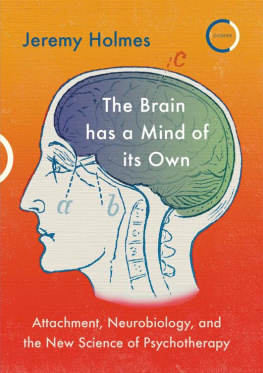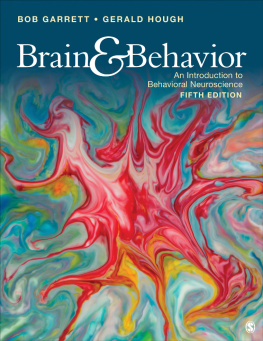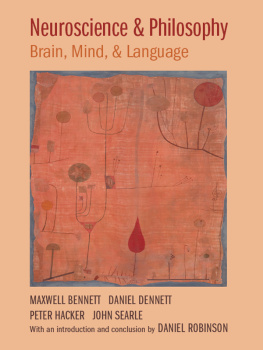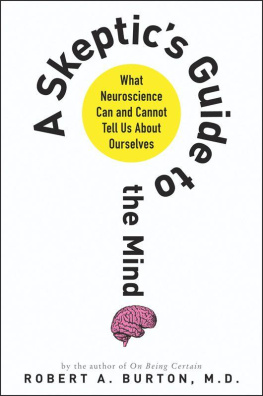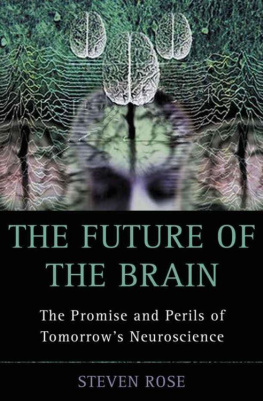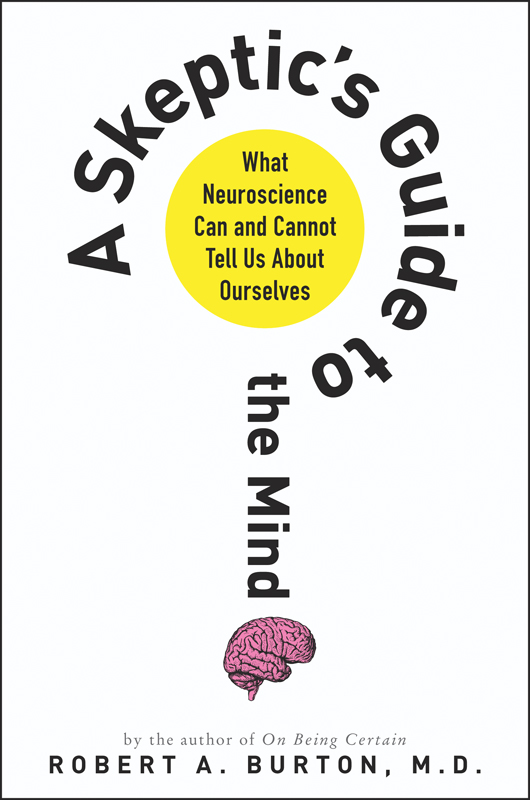
The author and publisher have provided this e-book to you for your personal use only. You may not make this e-book publicly available in any way. Copyright infringement is against the law. If you believe the copy of this e-book you are reading infringes on the authors copyright, please notify the publisher at: us.macmillanusa.com/piracy.
To Adrianne
Contents
Introduction
A book is the only place in which you can examine a fragile thought without breaking it, or explore an explosive idea without fear it will go off in your face. It is one of the few havens remaining where a mans mind can get both provocation and privacy.
attributed to Edward P. Morgan
Each of us has a pretty good sense of what a mind is. Its that indescribably vague, palpable, yet invisible something just behind the forehead that is responsible for our thoughts. Beyond that, all bets are off. Some say it is simply the software for the brain, or what the brain does. Others have a more cosmic view of a mind without boundaries, or a nonmaterial essence that transcends and survives the death of the body. For most of us, it is both the measure of the man and the tool whereby we make this measurement. In turn the value of this judgment depends on how we believe that our mind workshow much of our thought and behavior is dictated by underlying biological predispositions and involuntary unconscious brain activity and how much is within our conscious control.
The consequences of this determination are enormous at both a personal and a global level. From attributing motivation and assigning personal responsibility, to assessing the threat of a nuclear attack by North Korea or Iran, we are constantly being asked to read our minds and the minds of others. And yet, we have no idea what a mind actually is. Despite 2,500 years of contemplation and the more recent phenomenal advances in basic neuroscience, the gap between what the brain does and what the mind experiences remains uncharted territory. Though many scientists would like to believe that this gap can be fully bridged with further scientific advances, they are mistaken.
Science is the only method we have for establishing the factual basis of what the mind might be. But how do you adequately investigate something that cant be measured? Understanding how the brain works is great for describing biological functions, but still leaves us guessing as to what is being consciously experienced. Looking at the most detailed brain scans wont capture what we feel when we experience love or despair any more than examining the individual pixels in a Chuck Close painting will give you an overall sense of the painting. (To underscore how little we really know about the mind, we need only realize that some prominent philosophers still seriously debate whether or not the mind even plays a role in our behavior.)
Nevertheless, with powerful new imaging techniques such as the functional magnetic resonance imaging (fMRI) scan, cognitive science has become the de facto mode of explanation of behavior, rushing into the vacuum created by the failure of previous psychological and philosophical theories to fulfill their initial promise. Neuroscience is now seen as the preeminent model of the mind and the creator and guardian of our cultural mythology. It has garnered the ultimate status of a becoming a prefix. A new language is emerging: neuro-economics, neuro-aesthetics, neuro-theology, neuro-innovation, neuro-linguistics, neuro-marketing, neuro-networking. Philosophers commonly cite neurological case studies as evidence for their theories. Market crashes are explained by fMRIs. Neuroscientists tell us why we prefer Coke to Pepsi.
Such advances have been seductive to the academic community and the general public. What once were privately acknowledged among neurologists as metaphysical musings are increasingly being offered and seen as scientifically based facts. Like a child handed a new toy, the scientific community isnt likely to proceed with caution.
The race is on; the holy grail of science (and much of philosophy of mind) is to explain how a brain creates a mind. But the lack of rock-solid initial assumptions and consensus opinion as to what the mind is has resulted in a disjointed flurry of often unsupportable or contradictory behavioral observations. Try opening a newspaper or magazine without being confronted with yet another neuroscience tidbit being offered as an explanation of our behavior. Every day I see the most complex aspects of human behavior reduced to incomprehensible sound bites. For example, consider the number of dubious assumptions and logical inconsistencies necessary to come up with the recent headline in one of my favorite popular science magazines: Possible Site of Free Will Found in Brain. While some observations are real advances, others are overreaching, unwarranted, wrong-headed, self-serving, or just plain ridiculous.
If this were merely of academic concern, I wouldnt bother with this book. What alarms me is that a lack of clear understanding of what we can and cannot say about the mind and the commonly held belief in the unlimited powers of science are a potent recipe for potential catastrophe. Those old enough will recall when psychoanalysis was touted as hard science and schizophrenia was attributed to an overbearing mother (the so-called schizophrenogenic mother). How about the immense suffering caused by those psychologists who uncritically conjured up the recovered memory syndrome without having a clear understanding of how memory works? Or the Nobel laureate Antnio Egas Monizs advancement of frontal lobotomies because patients were easier to manage? Entire families were devastated by ideas that, at the time, seemed to make sense. Only in hindsight was the folly apparent.
And yet, like moths drawn to the flame, or amnesiacs who forget the lessons of history, brain scientists are repeating these same mistakes. Though it is easy to explain away their often unwarranted claims about the mind as arising from arrogance, greed, ignorance, or other psychological quirks, this book will pursue a more basic premise: our brains possess involuntary mechanisms that make unbiased thought impossible yet create the illusion that we are rational creatures capable of fully understanding the mind created by these same mechanisms.
Our brains have evolved piecemeal; contradiction, inconsistency, and paradox are built into our cognitive machinery. We are hardwired to experience unjustified feelings about ourselves, our thoughts, and our actions; we possess an irrepressible curiosity and desire to understand how the world works; we have developed an uncanny ability to see patterns whether or not they exist outside of our perceptions. Combine these traits with intrinsic cognitive constraints and you have the backdrop for modern-day neuroscience.
For me, the first step of any scientific inquiry should be a frank and open acknowledgment of the limitations of human thought, yet the recent spate of books and articles underscoring our inherent irrationality has done little to curb the excesses arising from a seemingly unshakable belief in pure reason. For neuroscientists and philosophers, as with the rest of us, the visceral feeling of knowing you are right is far more convincing than the thought that we have limits to our powers of reason.
Such prominent neuroscientists as Antonio Damasio confidently proclaim that the explanation of consciousness is around the corner. Others like the late Nobel laureate Francis Crick are convinced that the brain and the mind are the same, and that we can use our minds to make this determination. Such grand predictions are likely to escalate as more enter the increasingly popular and competitive field of neuroscience. (In 2009, more than one thousand grad students received a Ph.D. in neuroscience, with many more Ph.D.s granted in allied specialities such as psychology, adding to the tens of thousands already in the field.)





